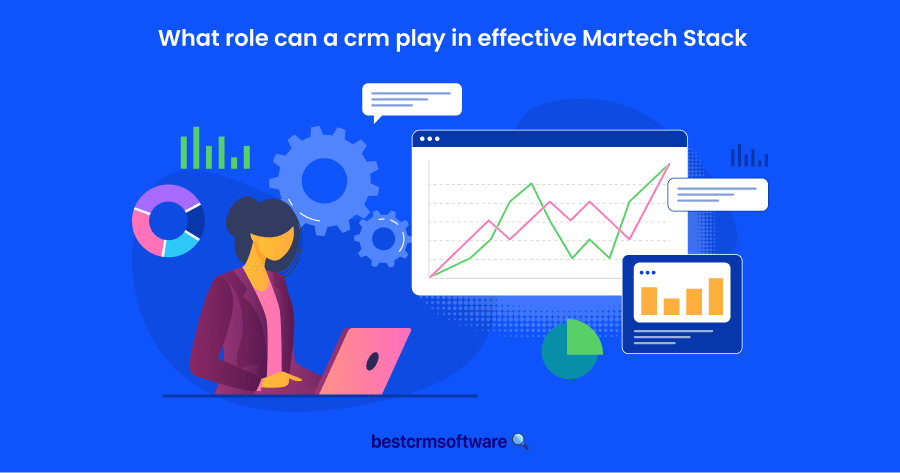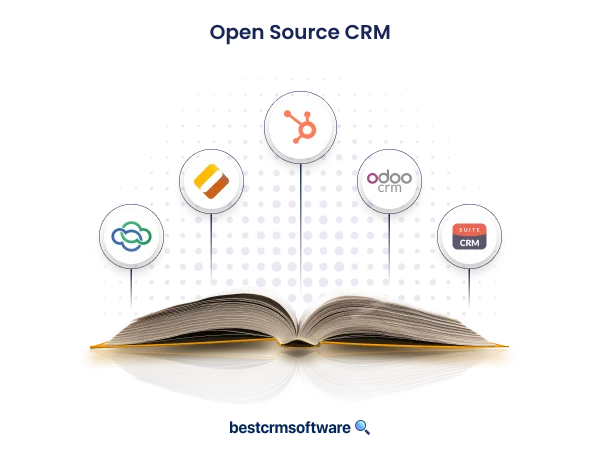
ERP vs. CRM: Differences and the Best Choice for Businesses
In a Nutshell
In today’s complex business landscape, understanding the distinctions between CRM and ERP systems is crucial. I should say that CRM systems focus on front-office activities like marketing and sales. On the other hand, ERP systems handle back-office functions such as finance and supply chain management.
Yet, integrating both systems into daily operations offers unparalleled efficiency and productivity. In my opinion, leveraging the strengths of CRM and ERP, businesses can optimize processes, enhance customer satisfaction, and drive growth.
5 Best CRM Software with ERP Features Shortlist
Here are my top five recommendations from the software selection process:
- Salesforce — Best CRM software for extensive customization and integration
- NetSuite — Best CRM software for personalized user interfaces
- Microsoft Dynamics — Best CRM software for versatility in deployment options
- Infor — Best CRM software for intuitive ERP solutions
- Acumatica — Best CRM software for adaptability to diverse industry needs
The Differences Between CRM and ERP Systems
CRM and ERP are two formidable options for businesses seeking to streamline their operations. Both are adept at consolidating data from various departments and automating tedious tasks. Yet, they possess unique roles within the corporate ecosystem.
Each fulfills a specific function tailored to distinct business needs. CRM systems bolster front-office activities like marketing, sales, and customer service. In contrast, ERP systems are the backbone of back-office functions. Such include:
- Finance
- Supply chain management
- HR

What is CRM?
CRM software streamlines how businesses interact with customers. It’s part of a set of tools, including:
- Marketing
- Advertising
- Customer service solutions
CRM keeps track of all customer data. This can be conversations with sales reps, purchases, and service requests. It updates this data using outside sources to ensure it’s complete and current. This information goes across the organization. This enables everyone to know what’s happening with each customer.
Some advanced CRM systems use AI to analyze customer histories and suggest sales strategies. CRM helps businesses manage customer relationships by organizing and utilizing customer data.
What is ERP?
ERP software is a tool that helps businesses manage and automate their everyday back-office tasks. These include:
- Accounting
- Purchasing
- Project management
- Managing the supply chain
- Handling risks
- Dealing with human resources
These systems often have additional financial planning, budgeting, forecasting, and reporting features. ERP makes operations smoother and easier to handle. It does this by bringing all these processes together in one place.
It gathers data from different sources and shares it between departments. Thus preventing duplication and ensuring that there’s one reliable source for important business information. ERP is like the central hub of a business, keeping everything running smoothly.

Differences in Key features
CRM systems are adept at managing customer interactions and facilitating sales processes. Key functionalities of CRM systems include contact management. This involves organizing and storing vital customer information. Such include:
- Names
- Addresses
- Contact details
Sales
Additionally, CRM systems excel in sales pipeline management. They enable businesses to track sales leads, manage pipelines, and forecast sales precisely. Another crucial aspect is marketing automation. There, CRM systems streamline marketing campaigns through automation tools. They encompass email marketing and social media advertising.
Customer Service
Furthermore, these systems are instrumental in customer service. They provide robust features for managing inquiries, tracking interactions, and resolving issues promptly. Lastly, CRM systems offer sophisticated analytics and reporting capabilities. They empower businesses to analyze customer data comprehensively. Moreover, they can identify trends and seize opportunities for enhancement.
Back-Office Functions
Besides, ERP systems’ design streamlines and integrates various back-office functions. They ensure seamless operations across:
- Finance
- Human resources
- Supply chain
- Inventory management
- Manufacturing processes
Finance
Key features of ERP systems include robust financial management tools. I’d say they facilitate handling monetary transactions. Such are accounts payables, accounts receivables, and general ledger management.
Human Resources
In human resources, ERP systems excel in managing employee information. They oversee payroll, benefits administration, and performance tracking. Furthermore, these systems streamline inventory management. They track inventory levels, orders, and shipments, optimizing supply chain processes.
Supply Chain
Moreover, they play a pivotal role in supply chain management, supervising the flow of goods and services from suppliers to customers and ensuring efficiency and transparency. Additionally, ERP systems encompass manufacturing functionalities. Thus enabling businesses to plan and manage production processes. They encompass scheduling, quality control, and resource allocation.
CRM systems focus on customer-centric functionalities. These include managing customer data, sales automation, marketing campaigns, and customer service. In contrast, ERP systems specialize in integrating and optimizing back-office operations. They enclose finance, human resources, inventory management, supply chain, and manufacturing processes.
Integrating CRM or ERP
Integrating these systems into daily operations has become imperative. Businesses should aim to optimize processes, streamline data flow, and leverage insights.
Let’s focus on the significance, challenges, methods, and best practices. It’s crucial to understand the nuances of integrating CRM and ERP systems. By doing so, businesses can unlock synergies and achieve operational excellence.
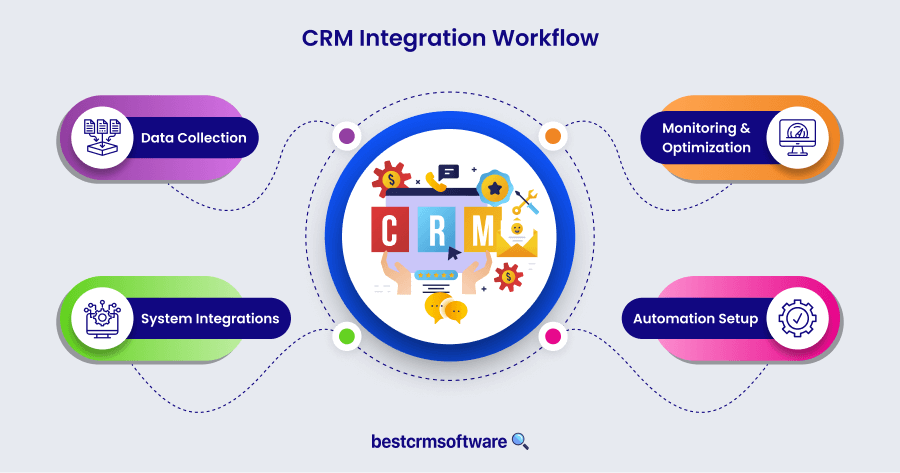
CRM Integration
Integrating CRM systems into daily business operations is a strategic move. It empowers companies to leverage customer data across various applications. Whether a business uses tools for lead generation, communication, or social media profiles doesn’t matter. CRM integration ensures a cohesive flow of customer data throughout these platforms.
Lead Collection
For instance, envision a small business employing a website form for lead collection. They use an email tool for customer communication and a social media platform for brand interaction. Integrating these disparate tools with a CRM makes the process streamlined and efficient.
The CRM automatically records interactions such as:
- Submissions
- Email clicks
- Social media engagements
Consolidating this data across interconnected systems. This centralized data management approach enhances understanding of customer needs. It enables personalized communication and targeted marketing campaigns.
Operational Needs
Businesses must weigh the benefits and intricacies specific to their operational needs when considering CRM integration. One of the primary advantages lies in creating a centralized hub for all customer and business data. This fosters a comprehensive understanding of customer preferences and interaction history.
The unified perspective facilitates anticipatory customer service. It enables businesses to address inquiries and tailor marketing efforts. For example, CRM integration allows storing detailed customer inquiries in an IT consulting firm. Thus empowering the sales team to personalize outreach and craft tailored solutions.
Moreover, this integration streamlines internal communication. It minimizes the time spent searching for pertinent information. Furthermore, it ensures all stakeholders remain informed and aligned.
Efficiency
CRM integration enhances workplace efficiency by providing instantaneous access to pertinent customer data. It eliminates redundant inquiries and optimizes workflow processes. Companies stand to gain significantly from CRM integration. This shows through improved customer experience, streamlined communication, and increased operational efficiency and productivity.
ERP Integration
Integrating ERP systems into a business’s software ecosystem is essential. It allows for seamless data exchange and synchronization across various functions. It connects the ERP system with other applications, databases, or external systems. This establishes a unified source of truth and improves productivity and insights.
Unlike CRM integration, which focuses on customer-related data and interactions, ERP integration encompasses a broader spectrum of business operations. This includes finance, human resources, inventory management, and production planning.

Compatibility
One of the key aspects of this system integration is ensuring compatibility and consistency between systems. It does this through mapping data fields. This process involves establishing communication channels and data exchange mechanisms. That’s how it enables seamless data flow between the ERP system and other applications.
Functions and Processes
CRM integration emphasizes customer-centric data management. Yet, ERP integration extends beyond customer interactions. It encompasses various business functions and processes.
Several conventional approaches exist:
- Point-to-point – This type of integration connects specific software applications directly.
- Enterprise Service Bus (ESB) – It’s an intermediary for communication between different applications.
- Integration Platform as a Service (iPaaS) – It’s for cloud-based integration solutions. They’re flexible, scalable, and need minimal coding.
I think companies should consider various factors when integrating ERP systems. This will help them ensure successful implementation and maximize benefits. These include assessing technical resources and budget constraints. Moreover, they’ll see improvements in their integration requirements, training needs, and security.
Businesses with limited technical expertise and budget constraints may opt for iPaaS solutions. These offer ease of use and scalability. Additionally, prioritizing data cleanup before integration is vital.
5 CRM Solutions That Offer Both CRM and ERP Features
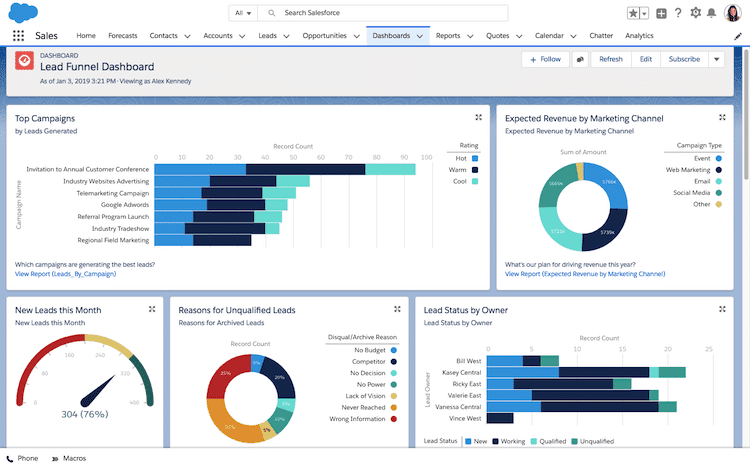
In my opinion, Salesforce stands tall as an industry-leading CRM. It often sets the benchmark for excellence in customer relationship management. Renowned for its comprehensive features, Salesforce offers businesses an all-in-one solution. It manages leads, contacts, customers, and more.
Salesforce empowers organizations to maximize their potential for closing opportunities and driving growth. Whether small businesses or large enterprises doesn’t matter. Those seeking an encompassing solution will find it rich in features and capable of meeting their needs.
Why I Like It
I appreciate Salesforce for its extensive customization and integration capabilities. For some, setting it up may pose some challenges. Yet, the support provided by the team ensures a smooth transition. The flexibility of tailoring Salesforce to meet specific business needs is admirable.
You can include any feature or functionality with many customization options. Moreover, Salesforce works with over 1,000 other platforms. This expands its utility and compatibility with various software solutions. Thus offering ample flexibility for seamless integration into existing workflows.
Most Important ERP Features
Per my experience, Salesforce has features that make it a top choice for managing sales pipelines. Its standout trait is its flexibility. It allows users to customize almost every aspect of their sales process. Salesforce covers everything. From basic lead management to advanced tools like forecasting and quoting.
Pros
- Only paid subscriptions
- Maintaining it is time-consuming
Cons
- Extensive customization options
- Powerful reporting
- Easy set-up
- Lead management and scoring
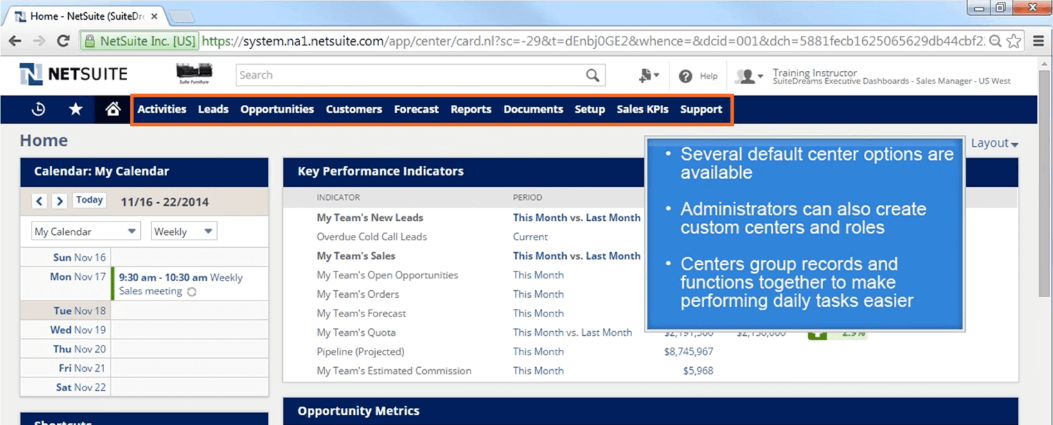
NetSuite offers a robust ERP platform that’s the backbone for managing crucial business functions. Such include:
- Accounting
- Inventory
- Orders
- Taxes
My tests conclude its core features provide a solid foundation, yet what sets NetSuite apart is its extensive range of customizable modules. These modules cover various aspects of business operations. With NetSuite, businesses can tailor their ERP experience to their needs and requirements. Thus making it a versatile and comprehensive solution for modern enterprises.
Why I Like It
NetSuite earns my approval for its exceptional customization capabilities. It allows businesses to tailor the platform further to their needs and preferences. You can create personalized user interfaces and generate branded documents. Moreover, it integrates with external applications.
Customizable Experience
NetSuite empowers users to customize their experience. Moreover, its robust reporting tools enable users to create comprehensive reports. These can be on various aspects of their operations, facilitating informed decision-making.
Visibility
Role-based dashboards enhance visibility. They enable employees and management teams to make data-driven decisions. The flexible pricing structure includes an annual license fee and the option to add users and modules as needed.
Versatility
NetSuite accommodates businesses of all sizes and growth stages. Pricing details are available only through consultations. Yet, NetSuite commits to tailoring solutions to each business’s unique requirements. They’re the meaning of customer satisfaction and success.
Most Important ERP Features
NetSuite offers a suite of robust features that cater to the diverse needs of businesses. Its SuiteCloud customization features enable easy tailoring. The platform can match specific business requirements.
The platform offers many built-in reporting tools. They empower users to generate comprehensive reports on their operations. Additionally, role-based dashboards provide visibility and enable data-driven decisions.
These are available across all levels of the organization. The flexible pricing structure allows businesses to scale their usage. They can add users and modules as needed, ensuring the system remains adaptable to evolving business needs.
Pros
- No demo version
- Need of a consultant for pricing
Cons
- Customizable
- Easy integration
- Versatility

I’d say Microsoft Dynamics stands out as a robust suite of business applications. It offers both cloud-based and on-premises ERP functionalities. This comprehensive solution caters to diverse business needs. You’ll find a range of applications available for:
- Sales
- Marketing
- Customer service
- Finance
- Supply chain
- HR management
Whether used individually or in conjunction doesn’t matter. These applications provide businesses with a centralized platform. They manage their operations and customer interactions. Microsoft Dynamics is worth exploring if you’re seeking a reliable ERP solution. Take a look at its versatility and integrated approach to business management.
Why I like it
What I particularly admire about Microsoft Dynamics is its versatility in deployment options. It offers both cloud-based and on-premises solutions to suit different business preferences. The inclusion of a mobile app adds immense value. This enables us professionals to manage our tasks and schedules efficiently while on the go.
Analytics
Moreover, its accounting and analytics features provide comprehensive tools to manage projects effectively. With it, you can gain insights into sales and project profitability. The seamless integration with other Microsoft products further enhances its appeal.
Most Important ERP Features
This ERP offers robust features designed to streamline business operations and drive growth. Its flexibility in deployment, whether in the cloud or on-premises. It provides businesses with options that align with their infrastructure preferences. With cloud deployment, companies can enjoy centralized data management. Moreover, they bypass the hassle of hardware and software maintenance. Thus facilitating efficient collaboration among remote and on-site teams.
Easy Deployment
Besides, on-premises deployment grants businesses full control over their data. This allows for customized updates and maintenance schedules. I can say the platform’s financial management and accounting capabilities have more benefits. Enterprises can optimize sales, manage cash flow, and gain insights from integrated data.
Reports and Analytics
Its reporting and analytics tools enable data-driven decision-making. You’ll have access to real-time dashboards, KPIs, and customizable reports. This includes a mobile app that ensures accessibility and productivity on the go. Microsoft Dynamics offers a comprehensive solution tailored to modern businesses’ diverse needs.
Pros
- Software integration is only available as an add-on
- There’s no free version
Cons
- A plethora of large business-oriented features
- Free Trial (30-days)
- Mobile app
- Available cloud service and on-premises solution
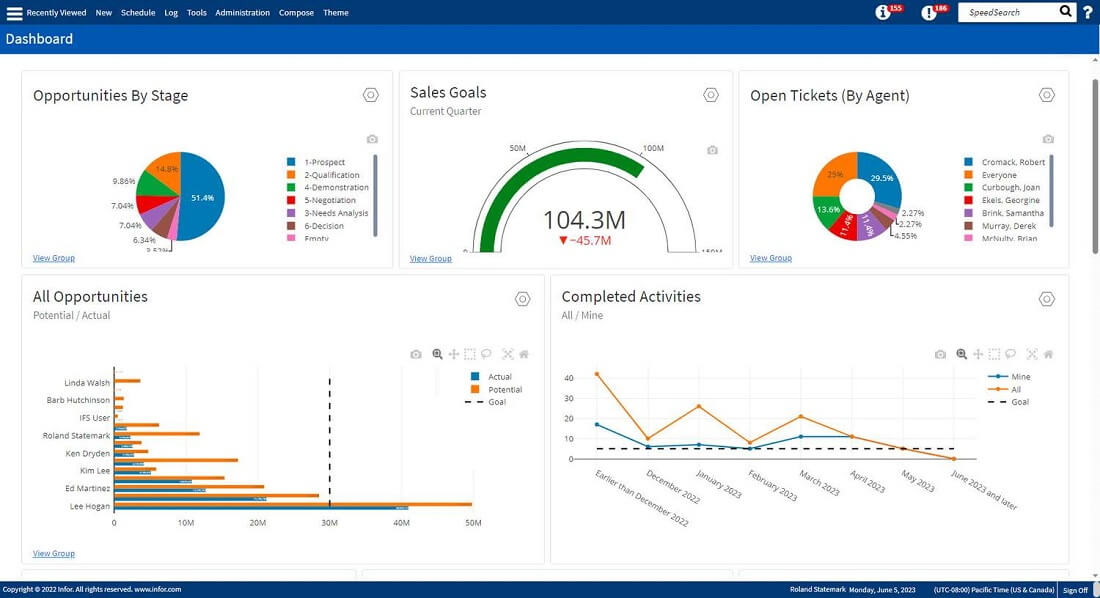
I think Infor stands out as a prominent player in ERP solutions. It offers robust software tailored to the efficient management of business operations. Founded in 2002, Infor ascended to global leadership status within the ERP software industry. Strategic acquisitions propelled this achievement. Thus, reputable ERP software entities such as Infor XA, SSA Global, and Lawson Software go into its fold.
Why I like it
Infor earns my acclaim as a favorable choice in the ERP software industry. It provides an attractive alternative to industry giants like SAP and Oracle. What sets Infor apart is its commitment to delivering intuitive ERP solutions. The company offers an easy-to-use interface, making it easier to grasp and navigate and solidifying its position in the market.
Cost-Effective
Infor ERP solutions boast swifter deployment and cost-effectiveness. Especially when compared to offerings from major competitors. The enterprise embraces the advantages of cloud technology. Infor Cloudsuite stands out with its features. These include:
- Cloud platform availability
- Modern user experience
- Integrating artificial intelligence (AI)
- Personalized features
- Robust data analysis capabilities
Availability
Infor operates across more than 200 countries. It caters to businesses of all sizes and sectors, offering a diverse product line. You’ll get cloud-based ERP solutions and specialized business applications.
Most Important ERP Features
Infor’s ERP solutions encompass a rich array of features. They’re essential for streamlined business operations. Human Resource Management (HRM) tools offer comprehensive solutions for employee data management. It benefits administration, payroll processing, and performance evaluation.
Supply Chain Management
Infor also has advantages In the realm of supply Chain Management. The company equips businesses with robust tools to oversee suppliers, inventory, logistics, and production planning. Thus ensuring efficient operations across the entire supply chain.
Finance and Accounting
Furthermore, finance and accounting management functionalities empower users to easily handle:
- Accounts payable and receivable
- General accounting tasks
- Budgeting
- Financial forecasting
Customer Relationship Management
Infor’s ERP suite also integrates CRM capabilities. They facilitate efficient sales management, customer service, and marketing activities. Businesses can use tools to create mailing lists, execute email campaigns, and analyze sales performance. Companies can drive growth and enhance customer engagement effectively.
Pros
- Add-ons are essential
Cons
- Enhances productivity levels
- Offers tools for better management
- Easy-to-use interface
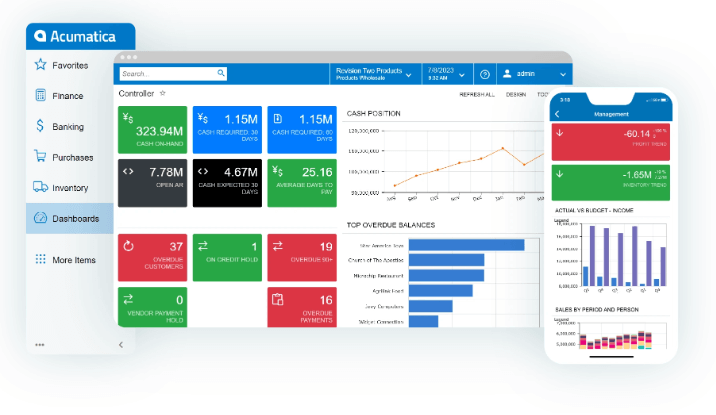
Acumatica stands out as a cloud-based ERP system tailored for businesses experiencing rapid growth. Its functionalities span from small and midsized to large enterprises. The company offers a range of flexible cloud hosting options. Acumatica ensures both the security and accessibility of data.
With its cloud-based approach, the platform delivers unmatched flexibility. You’ll get mobility and ease of use while reducing IT costs. Additionally, Acumatica fosters improved collaboration throughout the organization. Thus, it empowers teams to work more efficiently and effectively towards common goals.
Why I like it
Acumatica’s popularity stems from its versatility and adaptability to diverse industry needs. It has five specialized editions catering to sectors such as:
- Distribution
- Manufacturing
- Construction
- Retail Commerce
- General Business
Customization
Businesses can choose and license only the modules they need with its modular architecture. Plus, they can easily scale up as they grow.
Role-Based Views
Acumatica boasts role-based views and customizable dashboards. These empower users across various departments to access relevant information. This helps streamline workflows and enhance productivity.
Most Important ERP Features
In my reviews, I concluded that Acumatica offers key tools for business success. It helps manage finances by automating tasks and providing real-time financial insights. Its inventory management tools track stock levels and optimize inventory costs. Additionally, Acumatica connects with popular e-commerce platforms. This feature further streamlines order management and inventory synchronization.
Pros
- Cloud-only
- No public pricing is available
- There’s no free trial or demo version
Cons
- Perfect for growing businesses
- Future-proof with AI capabilities
- Remote and in-field collaborations
Get the Best Out of Both Worlds!
By integrating CRM and ERP systems, you can unlock unparalleled efficiency and productivity for your business. Manage customer relationships while optimizing your operations with powerful ERP functionalities. Don’t miss the opportunity to streamline your processes and enhance your business performance. Take the first step towards success by integrating CRM and ERP today!
Check out our other blogs too! Our CRM experts publish helpful content daily, covering everything from how-to guides to the benefits of CRM software.






